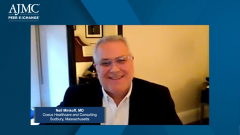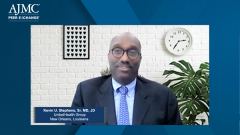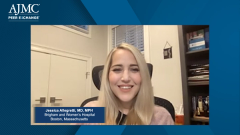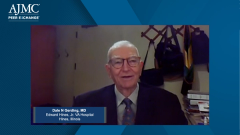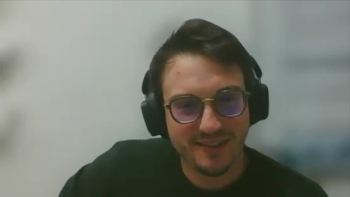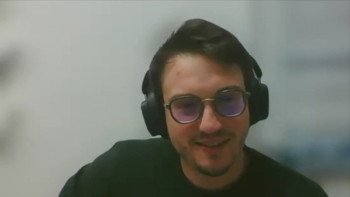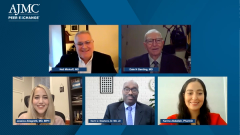
Barriers to Use of Fecal Microbiota Transplant in C. Diff Infection
A focused discussion on the barriers to fecal microbiota transplant for patients with clostridium difficile infection.
Episodes in this series

Transcript:
Neil Minkoff, MD: Let me ask the payers who are here, Dr Abdallah and Dr Stephens, to weigh in on how they cover FMT [fecal microbiota transplantation] and any of the barriers that are in the way for its use.
Kevin U. Stephens, Sr. MD, JD: The first thing is that it isn’t FDA approved yet.
Neil Minkoff, MD: Yes.
Kevin U. Stephens, Sr. MD, JD: That’s one of the barriers we have. The second thing is that we have to do it case by case. It’s a balancing act. You have to look at the prior treatment they used, the risk of recurrence, and the total cost of care. That’s where every case pretty much has to be one-on-one, because you have to weigh the pros and cons vs the patient satisfaction vs the risk of the recurrence and the total cost of care. You also have to look at outcomes. It’s based on all those things. That’s in the platform, particularly in the commercial market, of the payer. Many times the payer, in terms of the employer, will say, “We’re not covering it,” or “We will cover it.” It’s a tight space that we have to navigate in, to say the least.
Neil Minkoff, MD: Let me ask you a question. This is a naïve question from my point of view as a former PCP [primary care provider]. We hear a tremendous amount about FMT being so effective here. But it can’t always be effective, right? There must be negative outcomes. Dr Gerding, when do you see negative outcomes in FMT? What are those negative outcomes? Are there ways to predict it?
Dale N. Gerding, MD: The FDA has issued 3 safety warnings about FMT since 2019 because of transmission of a multidrug-resistant organism [MDRO], an ESBL [extended-spectrum beta-lactamase]–producing Escherichia coli, which resulted in bacteremia and death in a patient. This was traced to the donor stool that was used in the FMT. To answer your question, most of these patients who have run into these severe adverse effects have been very immunocompromised, and that’s one factor.
The second factor is that the donors haven’t been tested for the pathogens that were involved in these [situations]. As the FDA has issued the safety warnings, they have upped the criteria for testing the donor as well and put restrictions on donors. In the early days in FMT, medical personnel used to be common donors for fecal microbiota transplant material. After the multidrug-resistant organism transmission, the FDA has banned those people, as well as people who travel to other countries for medical care and come back. They can’t be donors any longer either. There have been a number of instances.
The second occurrence was transmission of toxigenic E coli and enteropathogenic E coli. There were a couple of deaths, but these weren’t directly attributed to that transmission. They were traced back to the donor again. As a result, the FDA has recommended that the testing for these strains of E coli be increased as well. And when the COVID-19 outbreak occurred, the FDA noted that COVID-19 was found in the stool and stopped donor efforts during that period until it could be established, but it needed to be done to clear the donors so they could safely donate stool for FMT products. It’s a combination of highly immunocompromised patients plus donors who are carrying organisms that were previously unrecognized as being potentially capable of transmission of infection. The FDA is tightening the controls around that, which is good, and it’s becoming safer.
There’s also a concern about long-term effects. This goes back to data from mice and rats in which you can swap out their microbiota, and as a result, change a lean mouse or rat into an obese mouse or rat simply by changing their microbiota. Those long-term concerns are still ongoing, but there are now registries available that are measuring the long-term outcome of FMT as well. To my knowledge, there haven’t been any long-term effects in humans so far. That’s a long way of saying that if you’re immunocompromised, you need to be careful about FMT, and if you’re a donor, you need to be tested thoroughly before you donate.
Neil Minkoff, MD: Dr Allegretti, I’m assuming that in your practice, you must have a number of patients on immunomodulators. Does that affect how you approach FMT?
Jessica Allegretti, MD, MPH: Yes and no. Dr Gerding eloquently outlined some of the more recent concerns that we’ve had, but there are some key points here. Prior to the summer of 2019, there had been no major reports of infection transmission from screened material. We’ve certainly seen case reports from people doing this at home with unscreened material and subsequent infections in that regard.
In the summer of 2019, that FDA safety warning took us all by surprise. The key takeaway point from that is those weren’t being done for Clostridioides difficile infection. Those were 2 cases being done in IND [investigational new drug] approved protocol. The FDA was already aware of these protocols. One was for hepatic encephalopathy, and the other for graft-vs-host disease. Those were very immunocompromised patients, and that was being done in a research protocol. They were being done using a hospital-based stool bank where the FDA was aware that they weren’t screening for MDROs in their protocol.
Probably the most well-known stool bank in the United States is OpenBiome, which is a nonprofit stool bank. It’s important to note that they’ve been screening for MDROs since their inception. The take-home points for me of that case was that while it was extremely unfortunate, it highlights the need for standardization. We should all be doing the same thing. The fact that it’s not FDA approved has led to different institutions essentially being able to have different protocols. It was helpful that the FDA finally released a list of the minimum mandatory screening requirements to get everybody on the same page.
There are some notable concerns with some immunocompromised patients, mainly for me, in that we don’t routinely test donors for EBV [Epstein-Barr virus] and CMV [cytomegalovirus] because the vast majority of people walking around are colonized with these organisms. If the patient has never been exposed, that may be a risk. In a very immunocompromised patient, I will often screen them to understand their EBV and CMV status, because that’s one situation where you may want to match the donor to the patient if the patient has never been exposed and is seronegative. But otherwise, I do this routinely in patients who are immunocompromised because I routinely use OpenBiome material.
The screening is very thorough. I include a very thorough informed consent discussion. The biggest concern with immunocompromised patients is that the FMT won’t work. There are higher failure rates, especially in a bone marrow transplant population where they’re on chronic antibiotics for prophylaxis long term. You have to take that into consideration, along with the fact that the patients may need more than 1. But we do this routinely in our patients with IBD [inflammatory bowel disease] who are often triple immunosuppressed, and we haven’t seen any major safety concerns. We actually performed the first prospective study looking at this, and the patients did extremely well.
You have to put the context into the big picture. Overall, this is a safe procedure. There have been a few highlighted cases of bad outcomes, but show me a drug that doesn’t have that. There’s a lot of more negative press or concern around FMT just because of the nature of how it came to the forefront. There’s a lot of scrutiny around it. But if you look at the totality of the data, this is a safe procedure.
Transcript edited for clarity.
Newsletter
Stay ahead of policy, cost, and value—subscribe to AJMC for expert insights at the intersection of clinical care and health economics.
